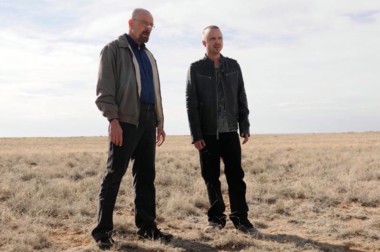[Editor’s note: This story contains no plot spoilers.]
Thirty years ago, going without TV meant truly going without TV. The best you could do was grab the ephemeral airing of a show via recorder. But now that TV shows have been liberated from one-time airings via broadcast, it’s possible to see almost anything whenever you want once it’s shown. Even if, like me, you don’t have cable, you can watch shows via Netflix, Amazon, and a host of other online conduits. And there’s always the emergency standby: a friend with cable and a recording device.
Because of that multiplicity of ways to watch, there’s a new phenomenon (and new term): binge watching. Those binges have weird effects. A two-week cramming of the entirety of Breaking Bad apparently immersed actor Anthony Hopkins in the show’s world so completely that he felt compelled to send an over-the-top fan letter to the show’s lead actor, Bryan Cranston. (He said, “Your performance as Walter White was the best acting I have seen—ever. …From what started as a black comedy, descended into a labyrinth of blood, destruction and hell. It was like a great Jacobean, Shakespearean or Greek Tragedy.”) All that goodness distilled into a dizzying few days becomes yet more potent.
It’s easy now to find a series and retreat to the couch, aglow in the blue, flashing brightness. The bleary numbness of channel surfing aimlessly into the small hours has been replaced with something more focused. It’s easy to find that, a few red-eyed hours later, you’ve devoured half of the existing output of a show. The major peril of this new media landscape may be that consumption quickly outpaces the still-massive undertaking of creating an hour of drama.
All that out-of-synch watching can also disjoint you in time and space—it’s easy to forget that the rest of the world is privy to the same images you’re so privately collecting. It seemed all wrong, in the glare of the next day’s light, that other people were describing the same Walter White misadventures I’d seen go down in his fictional Albuquerque.
In recent months, I too have employed the tools of new media with a vengeance, waiting every Monday with giddy anticipation for the post-airing arrival of Breaking Bad on Amazon Instant Video. The show, which I experienced at first in a new-fashioned binge, began as edge-of-the-chair entertaining. By the time it ended a scant few weeks ago, it had become one of the finest things ever to arrive on American screens, a sweat-drenched rollick whose cliff edges left viewers so white-knuckled some of us needed recovery time each week.
The wait from Sunday to Monday felt interminable, and it brought along a particularly contemporary danger: hearing plot spoilers from friends who’d seen the show as it aired. It’s another side effect of binge watching: once you catch up, you’re desperate for what happens next. Maybe even more desperate than cable subscribers.
Now that Walter White’s meth-drenched saga has come to its crazed conclusion, I’ve realized why it felt so good to ride the roller coaster in something near real time: as a practiced television malcontent, I haven’t breathlessly awaited episodes of a TV show in ages. It was refreshing to actually care. More refreshing still to see something good enough to care about.
Back in the polyester haze of 1979, I awaited Mondays with that same giddiness. Sunday night church services made it impossible for me to catch the broadcast of that pinnacle of Star Wars wannabe dreck, the original Battlestar Galactica. Because it combined two themes I soaked in—spaceships and Egypt—I loved it at least as much as Star Wars. I had to count on my piano teacher’s massive VCR (she was an early adopter, even before the term “early adopter” arrived) to deliver the goods after the fact. Nobody else had one yet.
On Mondays, I inhabited her parlor before my lesson, my eyeballs glazed with lasery dreams as the space-opera dreck unspooled to the clang of bad piano playing in the next room. I could not have been happier.
The revolution that began back then with home tape machines is finally, a surprisingly long time later, in its full flower. Following a show has quietly evolved into something very different in its contours.
In the new media landscape, a place in which we arrived almost without noticing, we lurch zombie-like from one thing to the next, draining each dry in a frenzy. The hunger doesn’t abate. We’ve accidentally discovered a new form of collective and personal angst. A terrible question, we’re learning, can arrive.
Once you’ve rapidly wound your way through a saga of such singular, draining power as Breaking Bad, your brain demands that its next major input be its equal. The question arrives: What next? What can equal Breaking Bad? (The grim truth is that if you’ve already seen The Wire, you’re probably out of luck.)
I gave in to Dexter, which came to a conclusion almost simultaneously with Breaking Bad—another double life, this one worse than Walter White’s, but its drama petered out. It became an improbable pile of twists and turns that led to head-scratchingly weird places, as if the writers had given up. I’ve tried Copper’s jarring and violent take on 1860s New York. I’ve moved on to the (often quite literally) visceral Victorian police procedural Ripper Street. It’s got promise.
But nothing grabs hold with the same alchemical power as Breaking Bad. Those who fell prey to its spell are the folks you see looking inexplicably hollow-eyed, bereft. We’re jealous of those for whom “blue meth” means nothing. Our standards have become impossible. If only we could emulate the character in the science fiction comedy Red Dwarf who erased his memories of Agatha Christie’s novels so he could read them all again. Till that technology arrives, we can only wander and hope.•



